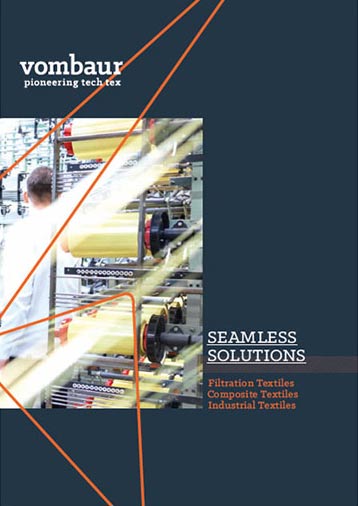SEAMLESS SOLUTIONS
In filtration, reinforcing components, conveyor belts, geo-textiles … – technical narrow textiles fulfil an important function in numerous processes and plants. At vombaur, we weave our tubulars and 3D fabrics on specially developed looms. The result: seamless woven tubulars that have the same surface properties in circumference and over the entire length.
No seam – many benefits
Round woven tubulars, 3D woven profiles and preforms
Our round- or form-woven narrow textiles do not have either seams or welds in the longitudinal direction. This means that they offer numerous advantages over fabricated tubulars, profiles and preforms:
From Aramid to PPS
Our narrow textile materials: perfect for your requirement
The raw material is a decisive factor for the functionality of technical textiles. From aramid to PPS, from carbon to polypropylene – we manufacture our narrow textiles from a wide range of materials. Which raw material is used – and how we process and refine it – is driven by your application. Depending on the mechanical, chemical and thermal charges acting on the material, we select the best material for your requirements.
Mono, multi, spun
The right fibre for every narrow textile
The properties of technical textiles are determined by various parameters. The type of filament plays an important role: depending on what function our narrow textiles are required to fulfil, we weave monofilament, multifilament or spun fibres.
Monofilament
A monofilament fibre – or stem fibre – is spun with a single-aperture spinneret and therefore consists of one single filament. This leads to precisely defined mesh sizes in the woven fabric.
Multifilament
Multifilament fibre consists of a bundle of several continuous individual filaments. A multifilament twisted from fine individual filaments ensures a filter process with lower filter fineness.
Spun fibre
Spun fibres consist of short fibres that are twisted together. Technical textiles woven from spun fibres are characterised by dense woven fabric structures with high retention capacity.
Taffeta, twill, satin
The type of weave affects how strong the narrow textile is, how drapable it is and the extent to which it becomes permeable.
Taffeta
In a taffeta fabric, the threads of the two yarn systems – warp and weft – cross each other at a ratio of 1 to 1: each thread pitch is followed by a thread draft. The taffeta weave produces a stable fabric bond. This gives even lighter woven fabrics high strength.
Twill
The twill weave can be easily recognised by the diagonal image of the fabric surface. The threads do not cross at a ratio of 1 to 1. The twill weave enables a higher thread density of the fabric in comparison with taffeta weave.
Satin
In a satin woven fabric, the warp threads are mainly visible on one side and the weft threads on the other. This is because a thread draft is followed by at least two thread rises. This results in fewer tie-downs overall. This means that a high thread density in both directions and a particularly smooth surface – e.g. satin fabric – can be produced.
Conductive narrow textiles
Dissipating electrostatic charge
Electrostatic charge cannot be prevented, but it can be dissipated. Our conductive tapes made of stainless steel wires, with carbon fibre content or with conductive coatings fulfil this function – for example in filter systems designed precisely for you.
vombaur: Your development partner
Your partner for seamless, textile engineered solutions
Our solutions are as special as the demands in terms of resilience and functionality of our narrow textiles. At vombaur, we develop and manufacture high-tech narrow textiles and composites that are precisely tailored to their respective applications. We always define the material, fibre type, weave and finishing of our textiles to suit the specific requirements of our customers. If necessary, we specifically redesign a production machine for this purpose so that the textiles have exactly the shape, specifications and functionalities that our customers need for their current application.
We are also happy to develop the perfect solution for you and your products. Perfect fit.
Process assured. Seamless.


